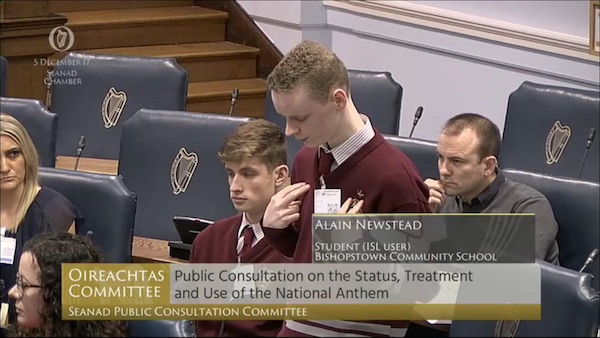
There were scenes of jubilation at the Dublin parliament this week when members of the deaf community celebrated the passage of a bill that officially recognises Irish Sign Language (ISL) as a language of the 26 County State.
Along with Gaelic and Shelta, the national sign language is one of Ireland’s three indigenous languages and is unique to Ireland. There is an estimated 5,000 people for whom Irish Sign Language is their first or only language, and approximately 40,000 hearing people who use ISL on occasion.
The Recognition of Irish Sign Language for the Deaf Community Bill 2016 is to be signed into law in the next few days by President Michael D Higgins.
The bill will significantly enforce the right to use Irish Sign Language as a native language and place a duty on public bodies to provide ISL interpretation free of charge whenever they seek to access State services and avail of their statutory entitlements. It will also give them the right to use ISL in legal or court proceedings.
Sinn Fein MEP Liadh Ni Riada welcomed the news that ISL is to be given full official language status in the coming days.
The Ireland South MEP said it was a welcome development but warned that equality does not stop at recognition and that action must follow.
“I’m delighted that the Dail is to finally get around to debating the ISL Recognition Bill, albeit a year and a half after first being introduced to the Seanad,” she said.
“This is tremendous news for the 50,000 plus ISL users in Ireland and a long overdue step to acknowledging the Deaf Community as a full, integral part of the wonderful tapestry that makes up our nation.”
Alain Newstead (pictured, centre), an 18-year-old student who has twice addressed the Seanad on matters relating to Irish Sign Language (ISL), including last year’s debate on the bill, was in the Dail when the bill passed.
He wrote to the Seanad two years ago when he realised that ISL is not legally recognised here like it has been in other countries since before he was born.
He addressed the Seanad last year on the issue, and again earlier this month when senators discussed issues around the National Anthem. Alain conveyed the frustration for deaf people of not having an official signed translation of Amhran na bhFiann.
“ISL is my first language and the language of thousands of other deaf people, and it needs to be included like in any other country,” said Alain, who lives in Carrigaline. “I want to be the same as my fellow citizens, I want to feel included.”
Sinn Fein’s Caoimhghin O Caolain said recent hearings on the issue had exposed the extent to which the Deaf Community experiences exclusion and isolation through the lack of sign language provision.
“One witness described that experience as one of “extreme marginalisation”, and this extends from the personal level right through to interactions with key organs of State such as the education system, the Court Service, the Health Service and including this Parliament, Dail and Seanad Eireann.
“The passing of this Bill would mean that deaf people in Ireland would finally be able to access state services in their own language.
“It will mean every public body having to devise and implement an action plan to promote the use of sign language within the organisation. It would also permit the use of sign language within the courts.
“It would advocate for the establishment of an Irish Sign Language Council which would regulate sign language interpreters and teachers. It will make a huge difference in the lives of so many.”
![[Irish Republican News]](https://republican-news.org/graphics/title_gifs/rn.gif)
![[Irish Republican News]](https://republican-news.org/graphics/title_gifs/harp.gif)

